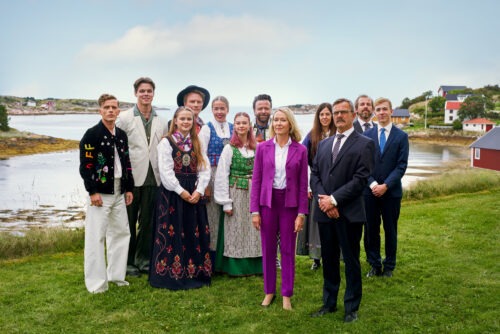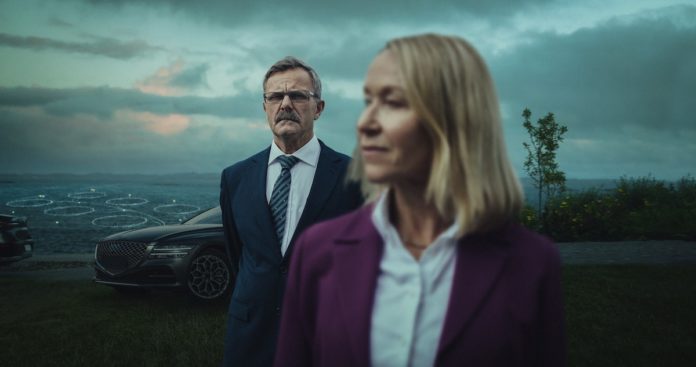Netflix new series expertly shows how those who live for profit inevitably pay the price, as personal relationships are sacrificed on the altar of corporate ambition.
To describe Billionaire Island as a drama about salmon farming is like calling King Lear a play about retirement.
Set on the fictitious island of Brima—stand-in for the real-world Frøya in Trøndelag—the series offers a compelling vision of coastal Norway by turns brooding and beguiling. Its gleaming fjords, fishing boats, and processing plants are backdrops to a story of wealth, corporate machinations, and familial decay.
So what is it about?
The plot centres on two rival clans, the Langes and the Meyers, who, like the salmon they harvest, find themselves caught in a relentless ebb and flow of power, ambition, and confrontation.
At the head of the Marlax empire is Julie Lange (a superb Trine Wiggen), a steely, pantsuit-clad CEO, as unyielding as the glass walls of the modernist palace she calls home.
Julie is determined to orchestrate a hostile takeover of her chief rival, Meyer Fjordbruk, a fading enterprise run by curmudgeonly patriarch Gjert Meyer (Svein Roger Karlsen).
The plot is simple enough: Julie wants to swallow up Gjert’s company and consolidate her dominance in Norway’s second-largest export industry. What follows is a series of corporate chess moves, boardroom battles, and backstabbing as cold as the Atlantic waters that lap Brima.
The careful balancing act between Julie’s cold ambition and Gjert’s stubborn machismo, coupled with their personal vulnerabilities, makes their evolving dynamic one of the show’s greatest strengths.

Beneath the surface
But what makes Billionaire Island more than a gentle satire of the corporate machinations of coastal Norway is its deft exploration of the personal toll such power struggles exact. This is not simply a drama about fish farms; it’s a careful dissection of the individuals caught in the net, and the slow unravelling of family bonds.
Julie, outwardly in control, navigates not only hostile takeovers but also the complexities of her fractured brood. Her daughter, Amy (Ragne Grande), works alongside her but is unable to assert her independence, while her son Jens Johan “JJ” Lange (Vetle Røsten Granås) is a self-indulgent model-turned-actor—a caricature of nepotistic excess who is more focused on his Instagram following than on any substantive contribution to the family business.
Meanwhile, Julie’s husband, Torbjørn, (Kåre Conradi) is an overindulged “house-husband,” loafing around their opulent home, getting high or indulging in extravagant day-long cooking sessions, his detachment from the high-stakes business world contrasting sharply with his wife’s cold ambition.
On the other side of this corporate trench are the Meyers, a family whose outward appearances are as unremarkable as their shabby headquarters. Moustachioed patriarch Gjert, a man out of time, embodies a leadership style as antiquated as the rusting Mercedes he stubbornly crawls around the island in.
His embittered daughter Trine (Hanne Skille Reitan) and her ineffectual husband Eigil (Tor Ivar Hagen), the beleaguered CEO of Meyer Fjordbruk, highlight a family dynamic filled with resentment and dysfunction, starkly contrasting the Langes’ turbulent yet warmer relationships.
Caught in the current
At its core, Billionaire Island is less about the salmon trade and more about what happens when people build their identities and their relationships on the shifting sands of power and wealth. The series juxtaposes moments of absurdity—JJ’s narcissistic acting career and his ludicrous agent Ivo (Axel Bøyum)—with darker, more introspective scenes. Julie’s ambition, Gjert’s stubbornness, and the foibles of their offspring are all examined with an unflinching gaze.
In this world, everyone has a price, and no one is beyond manipulation as the series artfully transitions from dry comedy to a psychodrama of betrayal, ambition, and ultimately, failure.
The show is not a fast-paced thriller; it is slow-burning, its rewards accruing with each episode. The humour is dry, often cruel, and distinctly Scandinavian in its understatement. It’s a study in contrasts: the glossy surfaces of wealth against the ugly realities of familial conflict, the idyllic setting of the Norwegian coastline against the bitter waters of corporate warfare.
And so, Billionaire Island may seem to orbit around fish farming, but its real focus lies elsewhere. Beneath the surface of corporate feuds and family intrigue, it’s a meditation on the fragility of human ambition.
The irony isn’t just that power can consume everything in its path—it’s that, like the fish these billionaires harvest, they too are caught in a current far stronger than themselves, swimming endlessly toward an uncertain fate.


